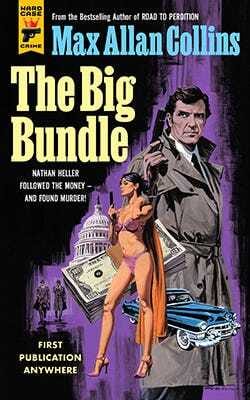Weekly Issue
I may have mentioned somewhere along the way that I read a lot.
I consume a couple of newspapers a day along with a few favorite blogs and news-focused websites. Then there are a few classical history and philosophy sites that I peruse pretty much daily as well.
I also usually have one nonfiction and at least one novel going at all times.
While novels are frowned upon by the “serious” reader unless they are “Important Works,” I have an affinity for spy novels, westerns, and crime thrillers.

If I have a say in the matter, the publishers at Hard Case Crime would win at least one or two Nobel Prizes.
I read to learn things and be entertained.
I come by it honestly.
Both of my parents were voracious readers, as are my sisters.
We used to save the bags from Mom’s weekly Safeway excursion to carry our haul from the library or bookmobile.
As I have gotten older, I have transitioned from reading late into the night while doing my best to create full employment in the bourbon industry to getting up with the dogs in the early hours and catching up on the world over coffee.
As an aside, one of the great mysteries of the world is what I call the Great Coffee Conundrum.

Every night my wife makes coffee, grinding beans and mixing two types of freshly ground beans into the machine so all I have to do is press the button in the morning on my way out the door with the little dog. (The big dog goes back to bed after breakfast. He is a high IQ beast.)
The result is coffee nirvana.
I can take the exact same ingredients, follow what I believe to be the exact same steps and measurements.
That will produce coffee that falls solidly in the average range of the scale if I’m lucky.
On a bad day the needle pegs the “Swill” button.
Saturdays are for all the quizzes and puzzles that have stacked up during the week along with longer reports and academic papers that have hit my inbox during the week.
Sundays tend to be a catch-all.
There are usually several Baseball Prospectus emails to read. The daily quizzes from Horsehide Trivia tend to pile up as well. (Did you know that Sam Crawford hit triples in double figures for seventeen consecutive seasons while playing for the Tigers and Reds starting in 1902? Neither did I.)
Two of my favorite emails come in at some point on Sunday morning.
The first is the Idea Farm email from Meb Faber at Cambria Investments. It is full of long institutional quality research on markets, economics, and other fields from some of the brightest minds in the world. It is not light reading, but it is thought-provoking, educational, and valuable.
Shockingly, Meb sends it out at no charge.
Go to MebFaber.com to sign up for the weekly emails. You should also check out his podcasts and white papers. Meb is one of the good guys and a brilliant thinker. Also check out one of the many books he has written including Invest With The House, Global Asset Allocation, Shareholder Yield, The Ivy Portfolio, Global Value, and The Best Investment Writing.
On his site right now, Meb is allowing you to download four of his books for free.
At some point later in the morning, the Acquirers Multiple email rolls in full of links to articles, podcasts, and research centered around value investing.
It is one of my favorite emails of the week. Acquirers Multiple founder, chief cook, and bottle washer Tobias Carlisle is the co-author of Qualitative Value along with Wes Gray of Alpha Architect and has written solo books including Deep Value, The Acquirer’s Multiple: How the Billionaire Contrarians of Deep Value Beat the Market, and Concentrated Value.
He has added a lot to the store of value investing information, insight, and the investor’s tool box.
This week the Weekly Roundup included an article with the eye-catching title “The Golden Age of Value Investing Is Over.” It was made more startling since it was an op-ed at Bloomberg written by noted Buffettologist and value aficionado Guy Spier.
I interviewed Guy back when his book The Education of a Value Investor: My Transformative Quest for Wealth, Wisdom, and Enlightenment was released back in 2014. I have traded a few emails and I get his annual letter every holiday season.
I consider him to be another of the good guys in this business.
Spier’s point was that in his opinion, AI in the form of large language models like ChatGPT and Claude had eliminated the edge provided by Buffett-esque value investing.
Spier wrote that “My conclusion is that the golden age of value investing is well and truly over. Thanks to the LLMs, I have no need for a junior analyst: At a fraction of the cost, an LLM can do a far better job. And the era of the swashbuckling hedge fund manager, Michael Steinhardt, George Soros, Julian Robertson, is also gone.”
He is correct.
While this is bad news for institutional value investors, it is great news for us.
It means deep value like the techniques that Warren Buffett used to make his first few million are more attractive than ever before.
AI will remove the edge in all but the smallest stocks.
The smallest stocks will continue to be ignored.
Larger companies will always be looking to buy smaller companies at a bargain price.
AI will make 80-90% of the market ruthlessly efficient.
The remainder will offer massive profit opportunities.
Even before AI came along, Charlie Munger was an advocate of looking to illiquid and inefficient markets for those seeking maximum returns. He once pointed out, “You’re not going to find a lot of opportunity in the obvious places where everybody’s looking. You find bargains when you have a marketplace that is inefficient and illiquid, and you’re willing to do the work.”
This is even more true in the age of AI.
Microcap stocks will be overlooked by almost all big institutions and retail investors will follow the same news sources talking about the same stocks.
Those willing to own small companies where insiders have skin in the game are going to be the ones that outperform.
Small companies with solid credit profiles trading for less than the value of their assets or low multiples of the cash produced by the business will improve and see the stock price recover or get bought out.
It is going to be a wonderful time to own small banks as consolidation continues.
Patience will earn a premium.
Spier also suggests this is the solution as he writes, “We can stick to human behaviors that work, which the indexers and the quant funds with their large organizations and programmed behavior cannot replicate. We can buy and hold, which is sometimes called time arbitrage.”
Trend following is still going to work as well. Markets will go up or down based on economic growth. Trend following will capture that.
There will be disasters and surprises and trend following will capture that.
AI will eliminate most traditional edges and all of the imaginary ones.
Almost all magic trading patterns will disappear from even the illusion of profits.
Arbitrage spreads in liquid markets will drop over time to the risk-free rate or in some cases disappear.
A crop shortage will still spur a rally in grains and trend following will catch that.
Industries and sectors will go in and out of favor based on economic conditions and geopolitics.
Value and trend will catch that and exploit it for investors willing to think outside the carefully constructed boxes of Wall Street and financial media.
Small companies with solid credit profiles trading for less than the value of their assets or low multiples of the cash produced by the business will improve and see the stock price recover or get bought out.
Small-cap Twin Momentum will also continue to work. Small companies that have growing sales and profits are eventually going to attract attention from the AI programs and the institutional investors who use them.
Those who get there first, when they are too small for the big money to care, will make a fortune when the herd tries to pile in at the same time.
AI is going to change a lot of what you think you know about investing and especially about trading. It is already almost impossible to make money trading against the machines.
AI is going to remove the phrase “almost” from everything, but strategies based on trend.
The machine will notice small discrepancies faster than you will ever be able to spot them and set up a trade.
You cannot beat the machines, so learn to play a different game.
Go where Wall Street, the big funds, and financial media are not.
Alternative income strategies will continue to work if you adopt a credit-focused mindset.
MLPs. No one likes K-1s or UBTI. Exploit that.
REITs are ignored despite a better long-term track record than the S&P 500 (and most mutual funds and money managers).
Mortgage REITs are the perfect tool to exploit economic volatility.
Partner with big PE firms and buy the BDCs they sponsor.
The bond market has always been fairly efficient. However, economics and politics will combine to create opportunities to lock in higher yields.
Lock them in when everyone hates bonds.
Focus on BB credit at discounted prices. Make volatility work for you.
Value, credit, and trend are the tools that will allow you to exploit the inefficient and illiquid opportunities created by the ruthless efficiency that Artificial Intelligence and the Thundering Herd are creating.

When markets become ruthlessly efficient, go where the machines cannot.
Tim Melvin
Editor, Tim Melvin’s Flagship Report